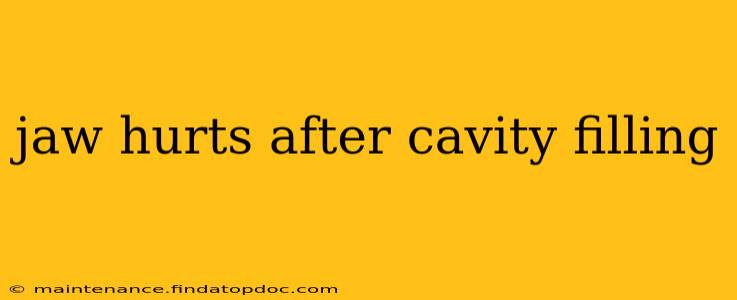A sore jaw after a cavity filling is a common experience, but it's crucial to understand why it happens and when it warrants professional attention. This discomfort can range from mild tenderness to significant pain, impacting your ability to eat, speak, and even sleep. This comprehensive guide explores the reasons behind post-filling jaw pain, effective relief methods, and when you should seek immediate dental care.
Why Does My Jaw Hurt After a Cavity Filling?
Several factors can contribute to jaw pain following a cavity filling. Understanding these underlying causes is the first step in finding relief.
-
Inflammation: The filling procedure itself, even a minimally invasive one, causes some degree of inflammation in the surrounding tissues. This inflammation can lead to localized pain and discomfort, particularly in the jaw muscles. The body's natural healing process usually resolves this within a few days.
-
Muscle Strain: During dental procedures, patients often unconsciously tense their jaw muscles. This tension can exacerbate existing temporomandibular joint (TMJ) disorders or create new ones, leading to prolonged jaw pain. The act of keeping your mouth open for an extended period can also contribute to muscle strain.
-
Irritation of the Nerve: While rare, the filling procedure might inadvertently irritate a nearby nerve. This can result in persistent pain that extends beyond the immediate filling site. This type of pain often requires further dental intervention.
-
High Filling: If the filling is placed too high, it can interfere with your bite, causing uneven pressure and jaw pain. This is a common cause of post-filling discomfort and necessitates an adjustment by your dentist.
-
Infection: In less common cases, an infection might develop at the filling site, leading to jaw pain, swelling, and other symptoms. Signs of infection include increased pain, swelling, redness, and pus.
-
Sinus Issues: Pain in the upper jaw can sometimes be confused with or related to sinus issues. This is particularly relevant for fillings in the upper molars. If your pain is accompanied by other sinus symptoms, you might need to consult an ENT specialist.
How Long Does Jaw Pain After a Filling Last?
The duration of jaw pain after a filling varies considerably depending on the underlying cause. Mild discomfort from inflammation usually subsides within a few days. However, pain stemming from muscle strain, a high filling, or nerve irritation can persist for longer periods, sometimes requiring several weeks to fully resolve. If pain intensifies or lasts beyond a week, it's important to consult your dentist.
What Can I Do to Relieve Jaw Pain After a Filling?
Several at-home remedies can help alleviate the discomfort:
-
Over-the-counter pain relievers: Ibuprofen or acetaminophen can effectively manage mild to moderate pain. Always follow the recommended dosage.
-
Warm or cold compresses: Applying a warm compress can help relax tense jaw muscles, while a cold compress can reduce inflammation. Alternate between warm and cold compresses for optimal results.
-
Gentle jaw exercises: Your dentist might recommend gentle stretching exercises to relieve muscle tension.
-
Soft foods: Avoid chewing hard or crunchy foods that could further irritate the area. Opt for softer foods that require minimal jaw movement.
-
Rest: Getting adequate rest allows your body to focus on healing.
When Should I See My Dentist About Jaw Pain After a Filling?
Seek immediate dental attention if you experience:
- Severe or persistent pain: Pain that doesn't improve with over-the-counter pain relievers or home remedies.
- Swelling or redness: These are potential signs of infection.
- Difficulty opening your mouth: This could indicate a problem with your jaw joint.
- Fever: Fever accompanies some dental infections.
- Pain radiating to other areas: Pain spreading beyond your jaw could indicate a more serious issue.
Can a Bad Filling Cause Jaw Pain?
Yes, a poorly placed or defective filling can absolutely cause jaw pain. A high filling, for example, throws off your bite and puts excessive pressure on your jaw joint, leading to discomfort. A filling that doesn't fit properly might also trap food particles, potentially causing infection and subsequent jaw pain.
Can TMJ Cause Jaw Pain After a Filling?
While a filling itself isn't directly responsible for TMJ (temporomandibular joint) disorders, it can exacerbate pre-existing conditions or trigger new ones due to the increased jaw tension during the procedure. If you suspect your jaw pain is TMJ-related, your dentist might refer you to a specialist.
By understanding the potential causes of post-filling jaw pain and knowing when to seek professional help, you can ensure timely and effective management of this common dental issue. Remember, proactive communication with your dentist is key to a swift recovery.
